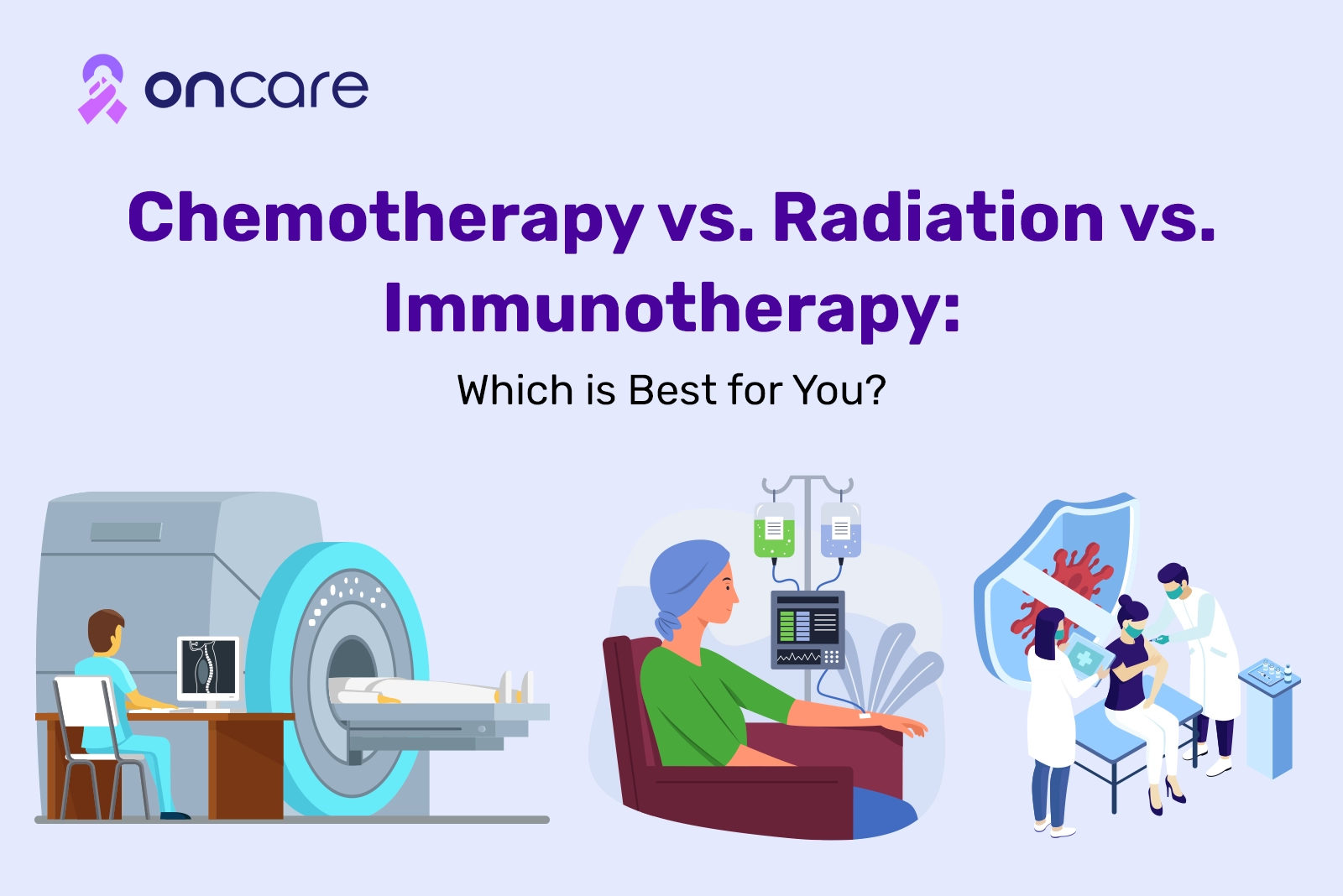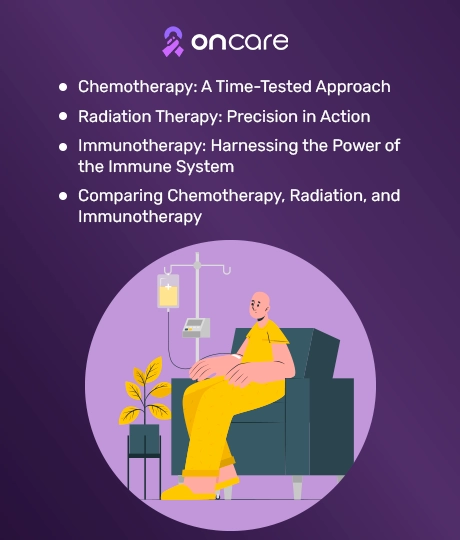Chemotherapy vs. Radiation vs. Immunotherapy: Which is Best for You?

Advances in cancer treatment over the years have brought many treatment options for patients that help them beat this disease. Currently, chemotherapy, radiation therapy, and immunotherapy are three prevalent options for treatment. Each of these has its working principle, its advantages, and its use for different types of cancers. However, regardless of what treatment you opt for, you must avail yourself of the services of a medically dignified and trusted healthcare provider. At Oncare, we offer world-class oncological care in a hygienic environment equipped with ultra-modern pathology, the newest technologies, and a highly qualified team of oncologists. Be it chemotherapy, radiation therapy, or immunotherapy, consult us to get the best and most personalized treatment options.
Chemotherapy: A Time-Tested Approach
Chemotherapy is, at present, the most popular method of cancer treatment. It uses strong medicines to destroy cancer cells or stop them from multiplying and growing. They can be taken by mouth, through an intravenous line, or in other ways, making chemotherapy a convenient treatment.
A. Key Uses of Chemotherapy
Metastatic cancers are mainly treated with chemotherapy because they depart from their original location, with chemotherapy killing off cancer cells all over the body.
In some cases, chemotherapy has been used to reduce the size of a tumor before surgery so that there are more chances of a successful outcome. Most of the time, it is combined with radiation therapy or surgery to improve effectiveness.
B. Benefits of Chemotherapy
There are multiple benefits of chemotherapy:
- Diverse Applications - It cures different types of cancer, including leukemia, lymphoma & breast cancer.
- Success History - Chemotherapy has been established to work well on cancer patients and has been used in clinical practice for several decades with good evidence backing it.
- Accessibility - It is readily accessible and can be easily adjusted to meet individual patient requirements.
C. Challenges of Chemotherapy
Although effective, chemotherapy can cause fatigue, nausea, hair loss, and lowered immunity. But with the right approach and care, you can deal with these side effects easily. Our team of experienced oncologists at Oncare is committed to minimizing them and assuring a comfortable chemotherapy process for you.
D. Suitable Candidates for Chemotherapy
Chemotherapy works well with types of cancer such as leukemia, lymphoma, and many forms of breast and lung cancers; because of this factor, it becomes the most important treatment in patients with metastatic cancer (non-localized cancer cells), or those who require shrinkage of the tumor before surgery or radiation.

Radiation Therapy: Precision in Action
In contrast to chemotherapy, radiation therapy is a more localized treatment, where only a certain part or area of the body where the cancerous tumor is located is dealt with. High-energy particles or waves such as X-rays or protons are considered in radiation therapy in order to destroy or damage cancer cells.
A. Key Uses of Radiation Therapy
Localized tumors respond really well to radiotherapy meaning that the cancer is contained within a certain area. The example includes cancers of the head and neck, breast, prostate, and cervix, among other types. When the diseases are advanced in their aggressive escalation, radiotherapy would target additional means toward boosting the quality of life. Radiation therapy is also employed in pairs with chemotherapy or surgery for better impact.
B. Benefits of Radiation Therapy
Here are a few benefits of radiation therapy:
- Accuracy: Modern techniques, such as intensity-modulated radiation therapy (IMRT) and stereotactic body radiotherapy (SBRT), improve cancer targeting by allowing the doctors to irradiate the cancerous growth itself without affecting surrounding normal tissues.
- Effectiveness: Radiation therapy works very well on localized cancers and can provide the patient with sustained disease control.
- Minimal Intervention: Radiation therapy is noninvasive and has no direct incisions, which is a clear advantage over surgery concerning the length of recovery time.
C. Challenges of Radiation Therapy
Radiation therapy might cause skin irritation, fatigue, and damage to nearby tissues or organs. However, these effects are generally temporary & can be managed with proper care. With state-of-the-art technology that reduces side effects, we do our best to see our patients experience the best results and beat cancer confidently.
D. Best Candidates for Radiation Therapy
Radiation therapy is suitable for localized tumors, those which did not produce distant metastasis. It is an excellent option for palliation and the relief of symptoms arising from advanced cancer.
Immunotherapy: Harnessing the Power of the Immune System
Immunotherapy is, simply put, a revolutionary model of treatment that uses the action of the immune system to combat cancer. It typically differs from conventional chemotherapy and radiation therapy and works by directly targeting the cancer cells. In itself, immunotherapy works to boost the body's natural defense system against the disease.
A. Key Uses of Immunotherapy
Immunotherapies are most effective in the treatment of cancers such as melanoma, lung cancer, and various types of lymphomas. One of the main advantages of immunotherapy is that, unlike the other two, it trains the immune system to recognize and attack the cancer cells. So, in principle, its effect may continue to persist even after treatment stops. In most cases, it causes fewer and less severe side effects than other treatments, which makes it more tolerable for patients.
B. Benefits of Immunotherapy
Some unique advantages of immunotherapy are:
- Precision: It specifically targets the cancerous cells while sparing most of the healthy tissues, thus preventing unnecessary damage.
- Long-Term Impact: The immune system keeps recognizing the cancerous cells, lowering the chances of regrowth.
We at Oncare offer checkpoint inhibitors and CAR-T cell therapy to provide cutting-edge care to our cancer patients.
C. Challenges of Immunotherapy
Immunotherapy is more effective against cancers with certain characteristics at the molecular or genetic level. Certain curable side effects may also be caused related to the immune system, such as inflammation or autoimmune reactions.
D. Best Candidates for Immunotherapy
Immunotherapy is ideal in cancers with specific biomarkers, like high levels of the PD-L1 protein or microsatellite instability. It has achieved dramatic success in melanoma, lung cancers, and some forms of lymphoma and leukemia.
Comparing Chemotherapy, Radiation, and Immunotherapy
|
Treatment Type& |
Chemotherapy |
Radiation Therapy |
Immunotherapy |
|
How It Works |
Kills fast-growing cancer cells |
Uses high-energy rays to target tumors |
Boosts the immune system to attack cancer |
|
Best For |
Widespread cancers (like leukemia) |
Localized cancers |
Certain cancers like melanoma, lung cancer |
|
Scope |
Systemic (affects the entire body) |
Localized (targets specific areas) |
Targeted (focuses on specific cells) |
|
Treatment Duration |
Weeks to months |
A few weeks |
Month to years |
|
Recovery time |
Weeks to months |
A few weeks |
Varies (often quick healing) |
|
Long-term impact |
Potential for long term side effects |
Tissue damage risk and cell regrowth in treated area |
Potential for long lasting recovery |
|
Effectiveness |
High for rapidly dividing cancer cells |
High for Benign tumors |
High for Cancers with specific biomarkers |
|
Patient experience |
Physically challenging but manageable with supportive care |
Generally well-tolerated with minimal discomfort during sessions |
Often well-tolerated |
Conclusion
Going through cancer treatment is tough, but with the right care and support, you find it easier. One thing to consider is choosing an experienced oncologist who can give you the best possible treatment, whether that’s immunotherapy, radiation, chemotherapy, or a combination of these.
At Oncare, we’re dedicated to providing top-quality cancer care with a patient-focused approach. We offer a comprehensive range of therapies, including chemotherapy, radiation therapy, and immunotherapy, with personalized treatment plans and holistic patient support. Our experienced oncologists work closely with you to create a treatment course that gives you the best shot at recovery.